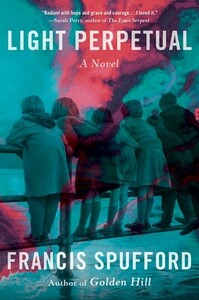Take a photo of a barcode or cover
I enjoyed the beginning, especially the story of the the main characters when they were children. Once they became adults, I found the story boring, the characters did not speak to me enough to continue.
dark
sad
slow-paced
Plot or Character Driven:
Character
Strong character development:
No
Loveable characters:
No
Diverse cast of characters:
No
Flaws of characters a main focus:
Complicated
The premise of ‘Light Perpetual’ is that it re-imagines what might have been the lives of five young children who were killed in one of the Luftwaffe bombings in London in 1944. The strength of the premise is questionable, as this mostly reads like a regular telling of five partially interwoven lives across decades. The narrative structure of the book is such that it follows an ensemble of characters, and jumps across random periods of time - effectively, we read vignettes of each character’s life when they are all young children, then meet them for short episodes when they are all in their early 20s, and again when they are about 35 years old, and so on. Ultimately, it felt as if there was no one to like or root for, and not enough to latch onto.
It seemed as if the book was written in a style to be consumed for the second read - the information seemed to appear in the wrong order, with overly familiar details about characters at the start, followed by more generic overviews of later periods of their lives. The experience of reading this was disorienting. It felt as if every detail was foreshadowing something else, but the ensemble-time-jump narrative structure meant that the payoff for most of it went over my head. I was left constantly wondering things like “Does it matter that this person always sings loudly and out-of-tune as a child?” - it probably did, but I wouldn’t be able to tell you why.
The concept of the book, that it was an alternative future for those who lost their lives in a Luftwaffe attack, is entirely lost in the story. We only encounter this idea in the opening of the book and in the titles of the chapters. I struggled as a reader to anchor myself in the premise, as it felt increasingly like a random novel about a few people who were classmates in the 1940s. The book aims to present a rich tapestry of the 20th century that those children would have missed. Instead, it reads more like a clinical checklist of events and tragedies that the UK experienced, distributed across five lives. One thing that did come across strongly was how much the world changes over the course of a lifetime. The beginning felt like a historic novel, with the characters navigating WWII and a London in ruins. When characters who would have been my age began to appear and build relationships with those same people who had experienced the world war, it gave me fresh and concrete appreciation for all that the eighty- and sixty- year olds around me have seen.
For most of the book I did not feel the tragedy of the lives lost, as I struggled to keep the premise of the book alive in my reading. Towards the end, however, as the core characters built communities, families and lives around themselves in their middle age, I began to feel the deep loss of the connections that would never have existed if the event of their early death had taken place. Watching the characters become loving step-parents, aunts and grandparents; encompassing and taking up space in so many lives - that brought to stark attention the size of the hole that might have existed if they had disappeared at the age of five.
emotional
inspiring
reflective
medium-paced
Plot or Character Driven:
Character
Strong character development:
Yes
Loveable characters:
Yes
Diverse cast of characters:
No
Flaws of characters a main focus:
Yes
Really cool concept and the writing was good but I didn’t care much about the characters
emotional
hopeful
reflective
slow-paced
Plot or Character Driven:
Character
Strong character development:
Complicated
Loveable characters:
Complicated
Diverse cast of characters:
Complicated
Flaws of characters a main focus:
Yes
4.5-⭐️: Hands down, one of the best last lines I’ve laid eyes on. {charred ribs} This book draws amazing characters and the dialogue is gold! This rating may creep up to a five-star rating later. It’s a surreal experience; as bleak as these lives were, there was something colorful and charming about Alec, Val, Ben, Vern, & Jo.
There are some traumatizing moments, which sneak up on you, because there’s an edge of whimsy which caught me off guard.
There are some traumatizing moments, which sneak up on you, because there’s an edge of whimsy which caught me off guard.
Another mediocre read in the Booker longlist for me.
Light Perpetual starts with an incident in 1944 where the shoppers in Woolworths were killed after a bombing (a real life incident). The book explores the life of 5 children at the store if they hadn't been killed and continues with their lives.
The premise is very interesting, but the author doesn't do much with it. We get to see the lives of these five children, their youth and their old age. There are five stories that you are following along with in different years, all spaced out. The characters rarely interact with each other but when they do, it is like finding a nest egg. I think those were my favorite parts of the book. Other than that, it just feels like an ordinary historical fiction novel following lives of these five people. Yes, the characters are all mildly interesting in their own way but I never felt invested in their lives or their characters. I wish there was more to the book, where we could probably see the reality and compare it with this alternate timeline.
Light Perpetual starts with an incident in 1944 where the shoppers in Woolworths were killed after a bombing (a real life incident). The book explores the life of 5 children at the store if they hadn't been killed and continues with their lives.
The premise is very interesting, but the author doesn't do much with it. We get to see the lives of these five children, their youth and their old age. There are five stories that you are following along with in different years, all spaced out. The characters rarely interact with each other but when they do, it is like finding a nest egg. I think those were my favorite parts of the book. Other than that, it just feels like an ordinary historical fiction novel following lives of these five people. Yes, the characters are all mildly interesting in their own way but I never felt invested in their lives or their characters. I wish there was more to the book, where we could probably see the reality and compare it with this alternate timeline.
reflective
Plot or Character Driven:
Character
Loveable characters:
Complicated
Diverse cast of characters:
No
In November 1944 a bomb kills five London children…but what if it hadn’t exploded - how could their lives have played out?
The book is based around an interesting premise - what potential was lost when the bomb exploded - and having really enjoyed Golden Hill, I was really looking forward to this one. I particularly appreciated that the children’s lives did not turn out to be glorious - nobody found a cure for cancer or brokered world peace, they all live fairly ordinary lives with ups and downs (though some more dramatic than others). The book is a bit of a snapshotted meander through the latter half of 20th century Britain - strikes, skinheads, property booms and crashes, etc. - managing to take in a surprising amount of societal changes and movements, and there was some very uncomfortable reading at times. We catch up with the main characters every fifteen years and hear (or deduce) what happened in the interim, and occasionally I felt that we skipped over an interesting development. The end of the book had very obvious Christian overtones which I wasn’t a huge fan of - it just felt shoehorned in (and also just isn’t my thing). Overall, I did enjoy it, and Spufford’s writing is exceptionally descriptive (in a good way). An exploration of consequences, lost potential and the arbitrary nature of death, told through interesting snapshots of life in Britain throughout the post-WWII 20th century.
emotional
hopeful
reflective
sad
Plot or Character Driven:
Character
Strong character development:
Complicated
emotional
mysterious
sad
medium-paced
Plot or Character Driven:
Character
Strong character development:
Yes
Diverse cast of characters:
Yes
Flaws of characters a main focus:
No




